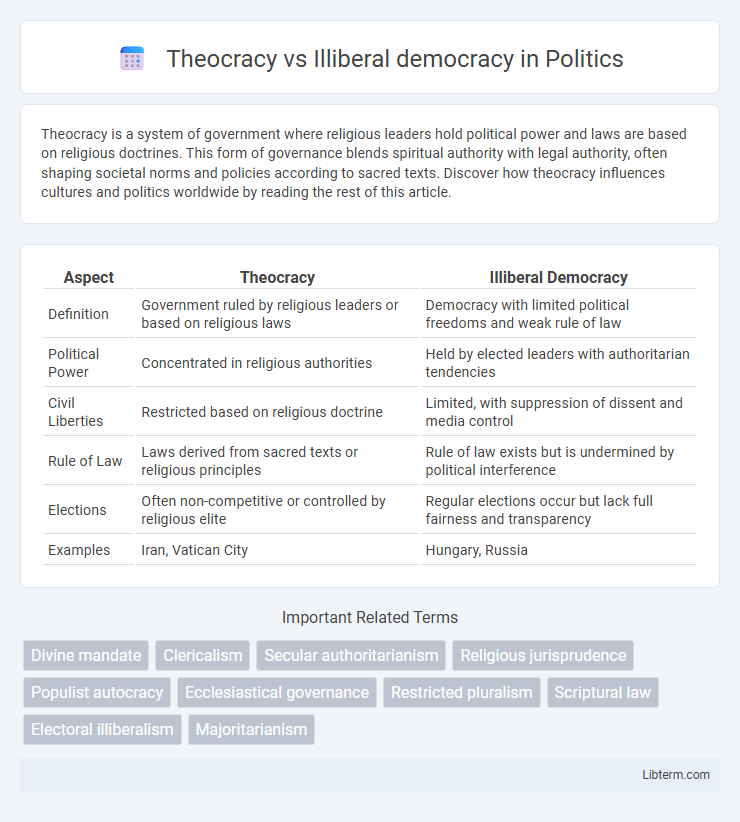Theocracy is a system of government where religious leaders hold political power and laws are based on religious doctrines. This form of governance blends spiritual authority with legal authority, often shaping societal norms and policies according to sacred texts. Discover how theocracy influences cultures and politics worldwide by reading the rest of this article.
Table of Comparison
| Aspect | Theocracy | Illiberal Democracy |
|---|---|---|
| Definition | Government ruled by religious leaders or based on religious laws | Democracy with limited political freedoms and weak rule of law |
| Political Power | Concentrated in religious authorities | Held by elected leaders with authoritarian tendencies |
| Civil Liberties | Restricted based on religious doctrine | Limited, with suppression of dissent and media control |
| Rule of Law | Laws derived from sacred texts or religious principles | Rule of law exists but is undermined by political interference |
| Elections | Often non-competitive or controlled by religious elite | Regular elections occur but lack full fairness and transparency |
| Examples | Iran, Vatican City | Hungary, Russia |
Defining Theocracy and Illiberal Democracy
Theocracy is a form of government where religious leaders control political power, and laws are based on religious doctrines, often merging church and state authority. Illiberal democracy features elected governments that maintain electoral processes but undermine civil liberties and the rule of law, limiting political pluralism and suppressing opposition. Both systems restrict democratic freedoms but differ in that theocracy bases governance on religious authority, while illiberal democracy concentrates power in a political elite without fully upholding democratic norms.
Historical Origins and Evolution
Theocracy originated in ancient civilizations such as Mesopotamia and Egypt, where religious leaders ruled based on divine authority, evolving through the Middle Ages with the influence of the Catholic Church and Islamic caliphates. Illiberal democracy emerged in the 20th century amid decolonization and Cold War tensions, characterized by electoral processes combined with limited political freedoms and concentration of power. Theocracy's foundation lies in the fusion of religion and governance, while illiberal democracy reflects a struggle between democratic forms and authoritarian practices.
Core Principles and Governing Structures
Theocracy centers governance around religious authority, where divine law dictates political decisions and religious leaders hold ultimate power. Illiberal democracy features elected governments that maintain limited political freedoms, often suppressing opposition and undermining the rule of law to concentrate authority. Both systems deviate from liberal democratic norms but differ in their foundations: theocracy grounds legitimacy in religious doctrine, while illiberal democracy derives authority from electoral processes coupled with authoritarian control.
Role of Religion in Governance
Theocracy places religion at the core of governance, where divine authority or religious leaders directly dictate laws and political decisions, often intertwining religious doctrine with state policy. In contrast, illiberal democracy may permit limited religious influence but lacks rigorous application of secular principles, resulting in governance that can involve religious bias without fully endorsing a theocratic system. Both systems demonstrate how religion can shape governance, but theocracy institutionalizes religious authority, whereas illiberal democracy restricts political freedoms while sometimes exploiting religious affiliations for power consolidation.
Limits on Political Pluralism and Freedoms
Theocracy restricts political pluralism by mandating governance according to religious laws, limiting freedoms to those aligning with the dominant faith. Illiberal democracy permits elections but suppresses opposition and curtails civil liberties, undermining genuine political competition. Both systems impose significant constraints on political freedoms, restricting diverse political expression and participation.
Citizen Participation and Representation
Theocracy centralizes power in religious leaders, limiting citizen participation to interpretations aligned with divine authority, whereas illiberal democracy permits elections but restricts genuine political competition and dissent, curbing true representation. In theocracy, representation is often indirect, filtered through religious doctrines that override popular will, while illiberal regimes maintain facade elections that do not ensure accountable governance or protect minority rights. Both systems constrain inclusive political engagement, but illiberal democracy masquerades as participatory while theocracy openly enforces hierarchical spiritual rule.
Legitimacy and Sources of Authority
Theocracy derives legitimacy from divine or religious authority, with religious texts and clergy serving as primary sources of power, often intertwining governance with spiritual mandates. Illiberal democracies, while maintaining electoral processes, derive authority from centralized political control and limited civil liberties, where legitimacy is often contested due to restricted pluralism and weakened rule of law. The fundamental difference lies in the theocracy's emphasis on sacred legitimacy versus the illiberal democracy's reliance on managed or controlled popular support.
Impact on Human Rights and Civil Liberties
Theocracy often restricts human rights and civil liberties by enforcing religious laws that limit freedom of expression, belief, and gender equality. Illiberal democracies compromise these freedoms by maintaining electoral processes while suppressing political opposition, controlling the media, and restricting judicial independence. Both systems undermine fundamental democratic principles, resulting in diminished protections for individual rights and limited public accountability.
Case Studies: Modern Examples
Iran exemplifies a theocracy where religious leaders hold ultimate political authority, with the Supreme Leader wielding substantial control over state institutions and policies. In contrast, Hungary represents an illiberal democracy characterized by elected officials undermining democratic norms through media control and judiciary interference, consolidating power while maintaining electoral legitimacy. Both cases highlight the erosion of liberal democratic principles, but Iran's governance is explicitly based on religious doctrine, whereas Hungary's regime sustains a facade of electoral democracy despite authoritarian practices.
Comparative Analysis and Global Implications
Theocracy centralizes political authority under religious leadership, enforcing doctrinal laws with limited pluralism, whereas illiberal democracy maintains electoral processes but restricts civil liberties and independent institutions, leading to constrained political competition. Comparative analysis reveals that theocracies often prioritize religious conformity over political dissent, while illiberal democracies manipulate democratic frameworks to legitimize authoritarian practices. Globally, these governance models challenge liberal democratic norms, complicate international relations, and influence regional stability by affecting human rights, rule of law, and democratic backsliding trends.
Theocracy Infographic

 libterm.com
libterm.com